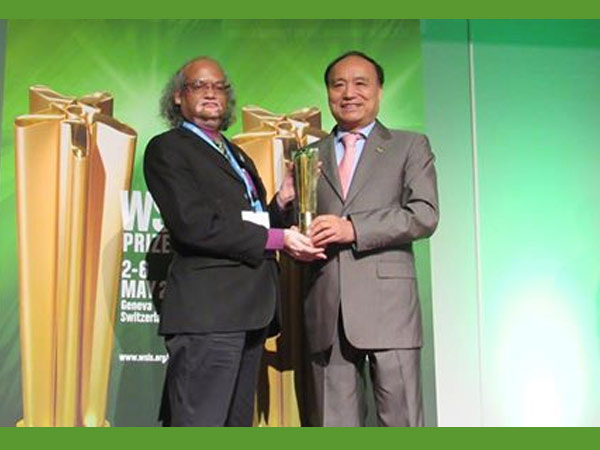GENEVA (Switzerland) May 4: Bangladesh NGOs Network for Radio and Communication’s (BNNRC) received the UN World Summit on the Information Society (WSIS) prize 2016. The World Summit on the Information Society Forum presented the award on May 3 as part of the WSIS Forum in Geneva, Switzerland. The WSIS forum is co-organized by ITU, UNESCO, UNCTAD, and the UNDP with the engagement of other United Nations Agencies , including WIPO, UNDESA, FAO, ILO, ITC, UNODC, UNEP,UPU, WMO, WHO, WFP, UN Women and the UN Regional Commission.
The prestigious prize was awarded in recognition to BNNRC’s successful implementation of the project on Youth Women in Community Media and Journalism – the beginning of a new era in rural broadcasting journalism of Bangladesh
After an intensive Online Voting phase, which ended on March 10th 2016, BNNRC’s project was among the most voted. Upon the Expert Group’s review of the 5 top voted projects, BNNRC has been selected as the winning one. The WSIS competition was among the 311 projects submitted for the online voting. The best prizes were announced following 245,000 online voting by the WSIS members. In addition to a total of 18 WSIS prize winners, 70 runners-up projects were also recognized as WSIS Prize 2016 Champions.
AHM Bazlur Rahman, Chief Executive Officer of BNNRC in his message said, we are indeed honored to have received this award. All of us at BNNRC are extremely proud that our work has been given this appreciation and recognition by the international community. BNNRC is grateful for this recognition. But BNNRC is not a winner. The real winners are 60 youth women community radio journalists those are working with 16 community radio stations in Bangladesh for ensuring voices of the voice-less in line with the poverty of voice.
BNNRC’s project, which was recognized for excellence in the implementation of the project, highlights the ‘voices of the rural people’ which essentially is the core of the rural broadcasting journalism programme, especially for the female journalists.
The youth women journalists, aged between 18 and 30, prior to joining their responsibilities in community radio broadcasting programmes and feature writing in local newspapers, were exposed to customised media training to strengthen understanding of reporting, news and script writing and editing during their fellowship programme held in three separate batches ranging from 3-6 months during 2013 and 2015. During the short-lived fellowship, the school and college graduate fellows joined as producers, anchors and reporters in 16 regional community radio stations some of which are located in remote coastal islands and in river banks. In pursuit of their fellowship programmes the youth women produced over 800 radio programmes and about 500 newspaper reports which largely focused on messages to free the society from the traditional caste system, good practices in health for women and children, end early marriages , social discrimination, violence against women, promote education, establish human rights and give more voices to the marginalized people.Using the information technology in broadcasting the empowered youth women journalists, the majority (40) of who come from Dalit families or the lowest caste in the society, demonstrated how the chemistry of creating opportunities and utilizing information technology can change the society – one of the most important criteria for nomination for the WSIS award.
The goal of WSIS is to achieve a common vision, desire, and commitment to building a people-centric, inclusive and development-oriented Information Society where everyone can create, access, utilize and share information. The WSIS Forum 2016 represents the world’s largest annual gathering of the ‘ICT for development’ community.
